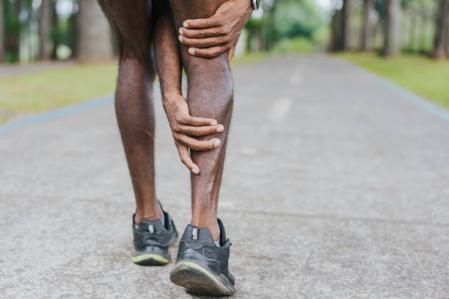20 Causes of Leg Cramps, and How To Stop Them
Dec 16, 2023 By Nancy Miller
Do you ever feel like your legs are seized with a cramp that won't go away? Is it keeping you from getting up or enjoying your favorite activity? Leg cramps are an annoying but common issue for many people, and understanding the underlying causes of them can help you find the right treatment plan. In this post, we'll cover 20 of the most common causes of leg cramps – so if they're nagging at your leg muscles, read on to find out what might be behind them!
What is Leg Cramps?
Leg cramps are sudden, involuntary contractions of the muscles in your legs that can cause intense pain and an inability to move your leg. They typically last anywhere from a few seconds to several minutes, but they can be so severe that you might need to take a rest or stop physical activity altogether. Leg cramps are most often reported at night during sleep, when the leg muscles are relaxed, but they can also occur during physical activities or even at rest.
20 Common Causes of Leg Cramps:

1. Dehydration:
Not drinking enough fluids can cause your body to become dehydrated, which can lead to muscle cramps in your legs. Make sure you're getting enough water each day!
2. Overuse:
If you're engaging in an activity that involves using your leg muscles more than usual, it can lead to cramping. Make sure to take regular breaks and stretch throughout your activities.
3. Magnesium deficiency:
Magnesium plays an important role in muscle contraction and relaxation, so a lack of this essential mineral can cause leg cramps. Eating magnesium-rich foods like nuts, legumes, and leafy greens can help with this.
4. Vitamin D deficiency:
Vitamin D is important for a healthy immune system and strong bones – but it also helps keep your muscles functioning properly. A deficiency can lead to cramping in the legs.
5. High sodium intake:
A diet that's high in sodium can cause dehydration and lead to leg cramps. Reducing your salt intake is key!
6. Medication side effects:
Many medications, such as diuretics and statins, can cause side effects that include muscle cramps. Talk to your doctor if you think this might be the case for you.
7. Excessive alcohol consumption:
Alcohol is a diuretic, so it can cause the body to become dehydrated – and this can lead to leg cramps.
8. Kidney disorders:
Certain kidney disorders, such as chronic kidney disease, can cause electrolyte imbalances that may lead to leg cramping.
9. Diabetes:
Diabetes can increase your risk of leg cramps because it can affect the nerves that control your muscles.
10. Pregnancy:
Hormonal changes during pregnancy can cause leg cramps, as well as the extra weight you’re carrying around!
11. Mineral deficiencies:
A lack of potassium, calcium, or other minerals in your body can lead to muscle cramping and weakness.
12. Low blood pressure:
Low blood pressure can cause decreased circulation, which can lead to cramping and a decrease in muscle strength.
13. Sitting or standing in the same position for too long:
This can put extra strain on your leg muscles, leading to cramps. Get up and move around regularly!
14. Tight clothing:
Wearing clothes that are too tight can restrict blood flow and cause leg cramps.
15. Stress:
Being under a lot of stress can make your body tense up, including the muscles in your legs. Taking time for self-care can help with this.
16. Poor nerve function:
Neuropathy – or damage to the nerves that control muscle movement – can lead to persistent leg cramps.
17. Sleep deprivation:
Getting too little sleep can cause leg cramps, as well as fatigue and decreased coordination.
18. Muscle injuries:
If you have a muscle strain or tear, it can lead to spasms in the affected muscles that cause cramping.
19. Thyroid disorders:
A thyroid disorder can affect your body's metabolism and lead to muscle cramping.
20. Varicose veins:
Having varicose veins can cause the muscles in your legs to cramp up due to decreased blood flow.
When Should You See a Doctor for Leg Cramps?

If your leg cramps are frequent or severe, don't go away after trying these home remedies, or are accompanied by other symptoms like swelling or numbness, it's important to see a doctor. They can help diagnose the underlying cause and provide further treatment options.
It's also important to talk to your doctor if you experience any of the following:
- Leg cramps that occur during physical activity
- Severe or persistent leg cramping that wakes you up at night
- Unexplained weight loss or fatigue
- Frequent muscle twitching or spasms.
Prevention Tips for Leg Cramp Sufferers:
The best way to prevent leg cramps is to maintain a healthy lifestyle. Here are a few tips that can help:
- Stay hydrated, especially when engaging in physical activity
- Exercise regularly and stretch before and after exercise
- Eat a balanced diet rich in magnesium, potassium, and other minerals
- Avoid alcohol and smoking
- Wear loose-fitting clothing and shoes that support your feet.
While leg cramps can be painful and troublesome, following these tips can help you reduce the frequency of them – so you can get back to doing what you enjoy!
Conclusions:
Leg cramps are a common issue that can be caused by many different factors. While they may not always have an underlying medical cause, it’s important to talk to your doctor if you experience frequent or severe leg cramps. The best way to prevent them is by living a healthy lifestyle and taking care of your body. Eating a balanced diet, staying hydrated, and exercising regularly can help keep your muscles healthy and prevent cramping.
-
 Jan 19, 2024
Jan 19, 2024What Is a Back Spasm?
Explore what triggers back spasms, learn about their symptoms, and discover the best treatment methods to live a healthier, active lifestyle.
-
 Feb 16, 2024
Feb 16, 2024All About Breast Cancer: A Detailed Overview
This comprehensive guide covers various types of breast cancer, their symptoms, risk factors, and treatment options. It also provides tips for managing life after diagnosis.
-
 Nov 08, 2023
Nov 08, 2023Discover the relationship between baby powder and cancer, and Johnson and Johnson baby powder lawsuit.
Baby Powder's Possible Connection to Cancer Risk
-
 Aug 02, 2024
Aug 02, 2024DIY Skincare Hacks with Aloe Vera
Learn DIY skincare hacks using aloe vera for stretch marks and oatmeal for eczema. Easy and natural solutions.
